Audit Opinion and Financial Statements
VerifiedAdded on 2020/03/07
|9
|1771
|30
AI Summary
This assignment delves into various scenarios concerning audits and financial statement preparation. Students must analyze situations involving potential issues like missing information, non-compliance with Australian Accounting Standards (AAS), and going concern doubts. The task requires applying auditing principles and ethical guidelines to determine the appropriate type of audit opinion – unqualified, qualified, adverse, or disclaimer – for each scenario. It emphasizes understanding the auditor's role in ensuring financial statement reliability and compliance.
Contribute Materials
Your contribution can guide someone’s learning journey. Share your
documents today.
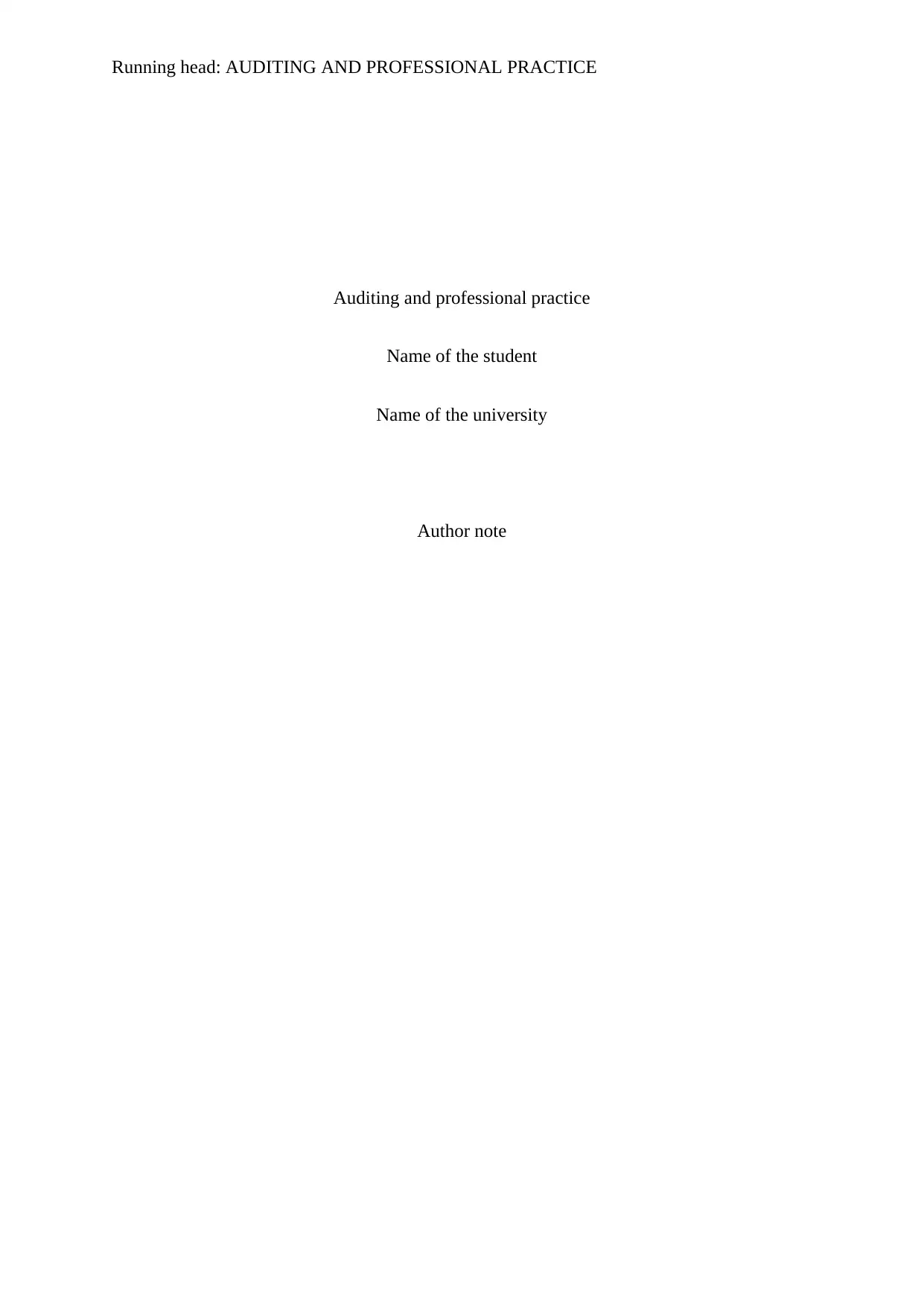
Running head: AUDITING AND PROFESSIONAL PRACTICE
Auditing and professional practice
Name of the student
Name of the university
Author note
Auditing and professional practice
Name of the student
Name of the university
Author note
Secure Best Marks with AI Grader
Need help grading? Try our AI Grader for instant feedback on your assignments.
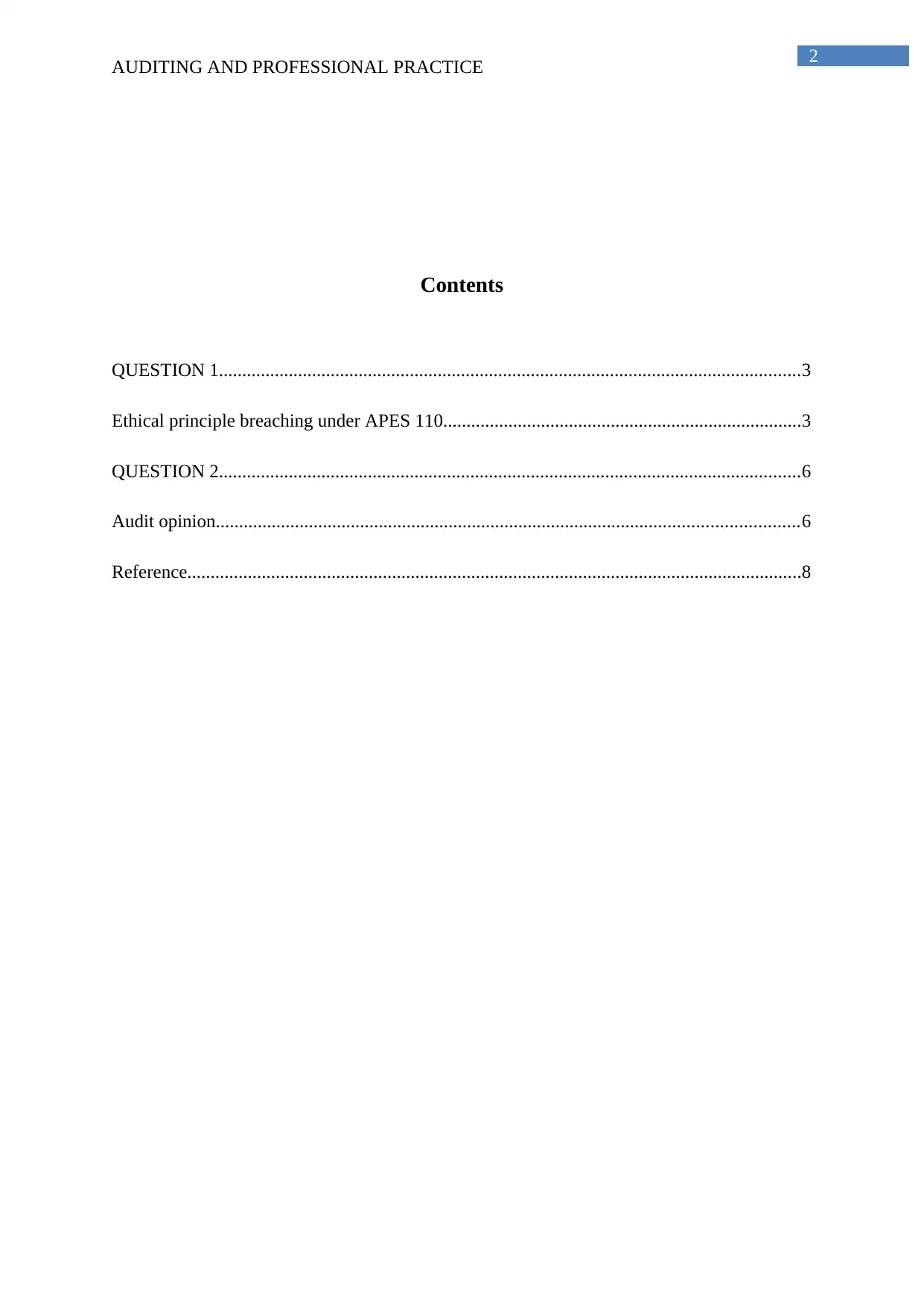
2
AUDITING AND PROFESSIONAL PRACTICE
Contents
QUESTION 1.............................................................................................................................3
Ethical principle breaching under APES 110.............................................................................3
QUESTION 2.............................................................................................................................6
Audit opinion.............................................................................................................................6
Reference....................................................................................................................................8
AUDITING AND PROFESSIONAL PRACTICE
Contents
QUESTION 1.............................................................................................................................3
Ethical principle breaching under APES 110.............................................................................3
QUESTION 2.............................................................................................................................6
Audit opinion.............................................................................................................................6
Reference....................................................................................................................................8
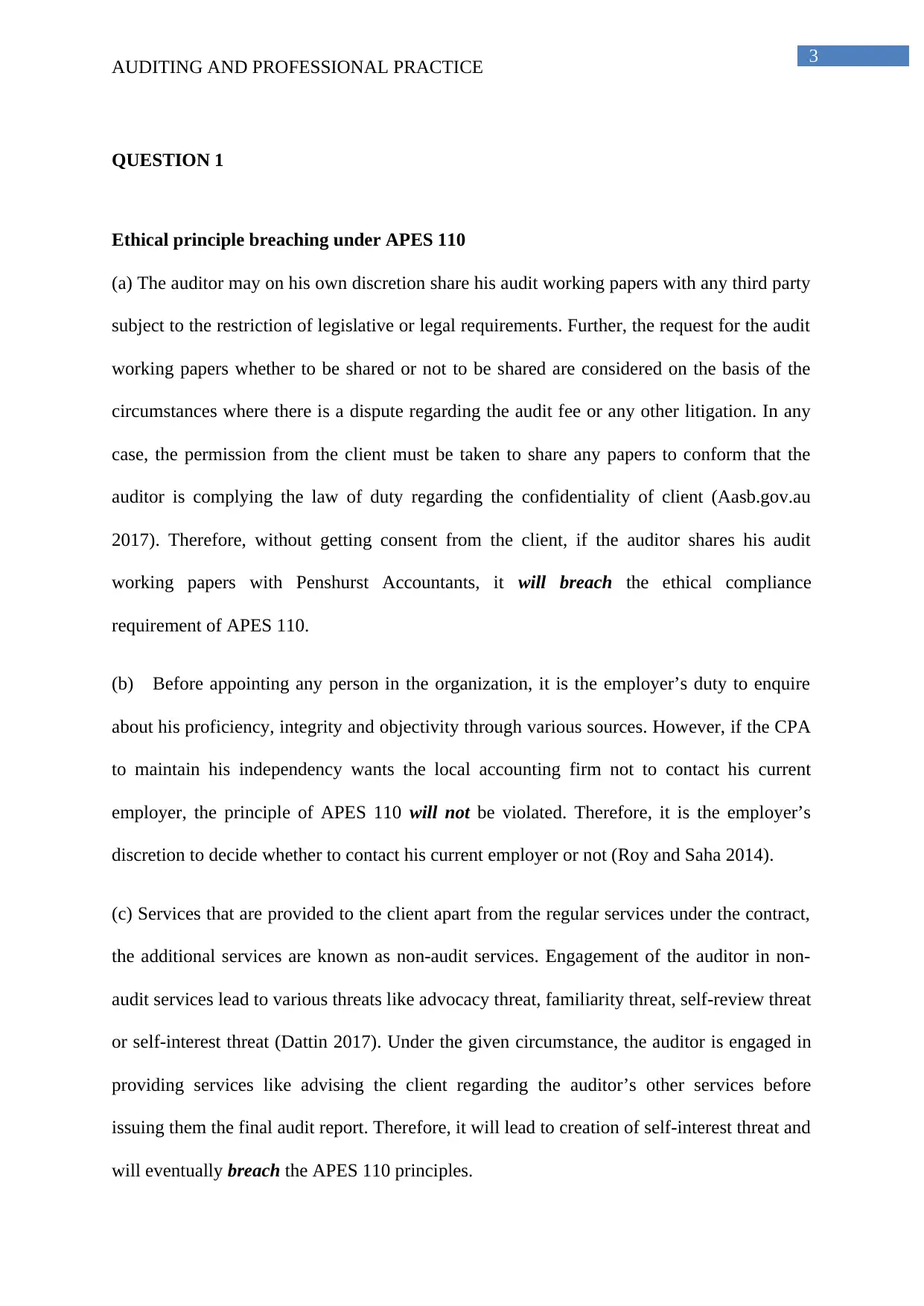
3
AUDITING AND PROFESSIONAL PRACTICE
QUESTION 1
Ethical principle breaching under APES 110
(a) The auditor may on his own discretion share his audit working papers with any third party
subject to the restriction of legislative or legal requirements. Further, the request for the audit
working papers whether to be shared or not to be shared are considered on the basis of the
circumstances where there is a dispute regarding the audit fee or any other litigation. In any
case, the permission from the client must be taken to share any papers to conform that the
auditor is complying the law of duty regarding the confidentiality of client (Aasb.gov.au
2017). Therefore, without getting consent from the client, if the auditor shares his audit
working papers with Penshurst Accountants, it will breach the ethical compliance
requirement of APES 110.
(b) Before appointing any person in the organization, it is the employer’s duty to enquire
about his proficiency, integrity and objectivity through various sources. However, if the CPA
to maintain his independency wants the local accounting firm not to contact his current
employer, the principle of APES 110 will not be violated. Therefore, it is the employer’s
discretion to decide whether to contact his current employer or not (Roy and Saha 2014).
(c) Services that are provided to the client apart from the regular services under the contract,
the additional services are known as non-audit services. Engagement of the auditor in non-
audit services lead to various threats like advocacy threat, familiarity threat, self-review threat
or self-interest threat (Dattin 2017). Under the given circumstance, the auditor is engaged in
providing services like advising the client regarding the auditor’s other services before
issuing them the final audit report. Therefore, it will lead to creation of self-interest threat and
will eventually breach the APES 110 principles.
AUDITING AND PROFESSIONAL PRACTICE
QUESTION 1
Ethical principle breaching under APES 110
(a) The auditor may on his own discretion share his audit working papers with any third party
subject to the restriction of legislative or legal requirements. Further, the request for the audit
working papers whether to be shared or not to be shared are considered on the basis of the
circumstances where there is a dispute regarding the audit fee or any other litigation. In any
case, the permission from the client must be taken to share any papers to conform that the
auditor is complying the law of duty regarding the confidentiality of client (Aasb.gov.au
2017). Therefore, without getting consent from the client, if the auditor shares his audit
working papers with Penshurst Accountants, it will breach the ethical compliance
requirement of APES 110.
(b) Before appointing any person in the organization, it is the employer’s duty to enquire
about his proficiency, integrity and objectivity through various sources. However, if the CPA
to maintain his independency wants the local accounting firm not to contact his current
employer, the principle of APES 110 will not be violated. Therefore, it is the employer’s
discretion to decide whether to contact his current employer or not (Roy and Saha 2014).
(c) Services that are provided to the client apart from the regular services under the contract,
the additional services are known as non-audit services. Engagement of the auditor in non-
audit services lead to various threats like advocacy threat, familiarity threat, self-review threat
or self-interest threat (Dattin 2017). Under the given circumstance, the auditor is engaged in
providing services like advising the client regarding the auditor’s other services before
issuing them the final audit report. Therefore, it will lead to creation of self-interest threat and
will eventually breach the APES 110 principles.
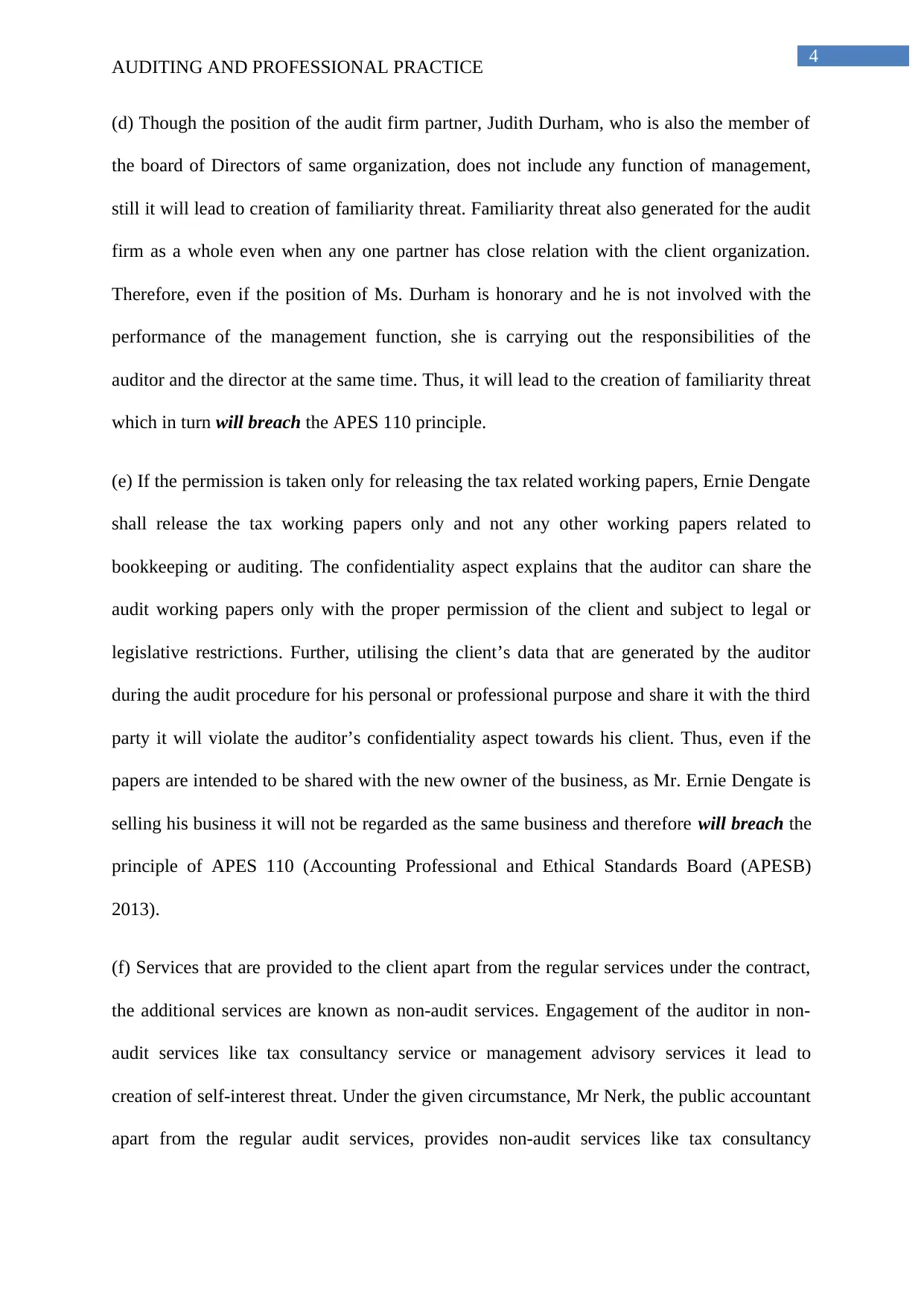
4
AUDITING AND PROFESSIONAL PRACTICE
(d) Though the position of the audit firm partner, Judith Durham, who is also the member of
the board of Directors of same organization, does not include any function of management,
still it will lead to creation of familiarity threat. Familiarity threat also generated for the audit
firm as a whole even when any one partner has close relation with the client organization.
Therefore, even if the position of Ms. Durham is honorary and he is not involved with the
performance of the management function, she is carrying out the responsibilities of the
auditor and the director at the same time. Thus, it will lead to the creation of familiarity threat
which in turn will breach the APES 110 principle.
(e) If the permission is taken only for releasing the tax related working papers, Ernie Dengate
shall release the tax working papers only and not any other working papers related to
bookkeeping or auditing. The confidentiality aspect explains that the auditor can share the
audit working papers only with the proper permission of the client and subject to legal or
legislative restrictions. Further, utilising the client’s data that are generated by the auditor
during the audit procedure for his personal or professional purpose and share it with the third
party it will violate the auditor’s confidentiality aspect towards his client. Thus, even if the
papers are intended to be shared with the new owner of the business, as Mr. Ernie Dengate is
selling his business it will not be regarded as the same business and therefore will breach the
principle of APES 110 (Accounting Professional and Ethical Standards Board (APESB)
2013).
(f) Services that are provided to the client apart from the regular services under the contract,
the additional services are known as non-audit services. Engagement of the auditor in non-
audit services like tax consultancy service or management advisory services it lead to
creation of self-interest threat. Under the given circumstance, Mr Nerk, the public accountant
apart from the regular audit services, provides non-audit services like tax consultancy
AUDITING AND PROFESSIONAL PRACTICE
(d) Though the position of the audit firm partner, Judith Durham, who is also the member of
the board of Directors of same organization, does not include any function of management,
still it will lead to creation of familiarity threat. Familiarity threat also generated for the audit
firm as a whole even when any one partner has close relation with the client organization.
Therefore, even if the position of Ms. Durham is honorary and he is not involved with the
performance of the management function, she is carrying out the responsibilities of the
auditor and the director at the same time. Thus, it will lead to the creation of familiarity threat
which in turn will breach the APES 110 principle.
(e) If the permission is taken only for releasing the tax related working papers, Ernie Dengate
shall release the tax working papers only and not any other working papers related to
bookkeeping or auditing. The confidentiality aspect explains that the auditor can share the
audit working papers only with the proper permission of the client and subject to legal or
legislative restrictions. Further, utilising the client’s data that are generated by the auditor
during the audit procedure for his personal or professional purpose and share it with the third
party it will violate the auditor’s confidentiality aspect towards his client. Thus, even if the
papers are intended to be shared with the new owner of the business, as Mr. Ernie Dengate is
selling his business it will not be regarded as the same business and therefore will breach the
principle of APES 110 (Accounting Professional and Ethical Standards Board (APESB)
2013).
(f) Services that are provided to the client apart from the regular services under the contract,
the additional services are known as non-audit services. Engagement of the auditor in non-
audit services like tax consultancy service or management advisory services it lead to
creation of self-interest threat. Under the given circumstance, Mr Nerk, the public accountant
apart from the regular audit services, provides non-audit services like tax consultancy
Secure Best Marks with AI Grader
Need help grading? Try our AI Grader for instant feedback on your assignments.
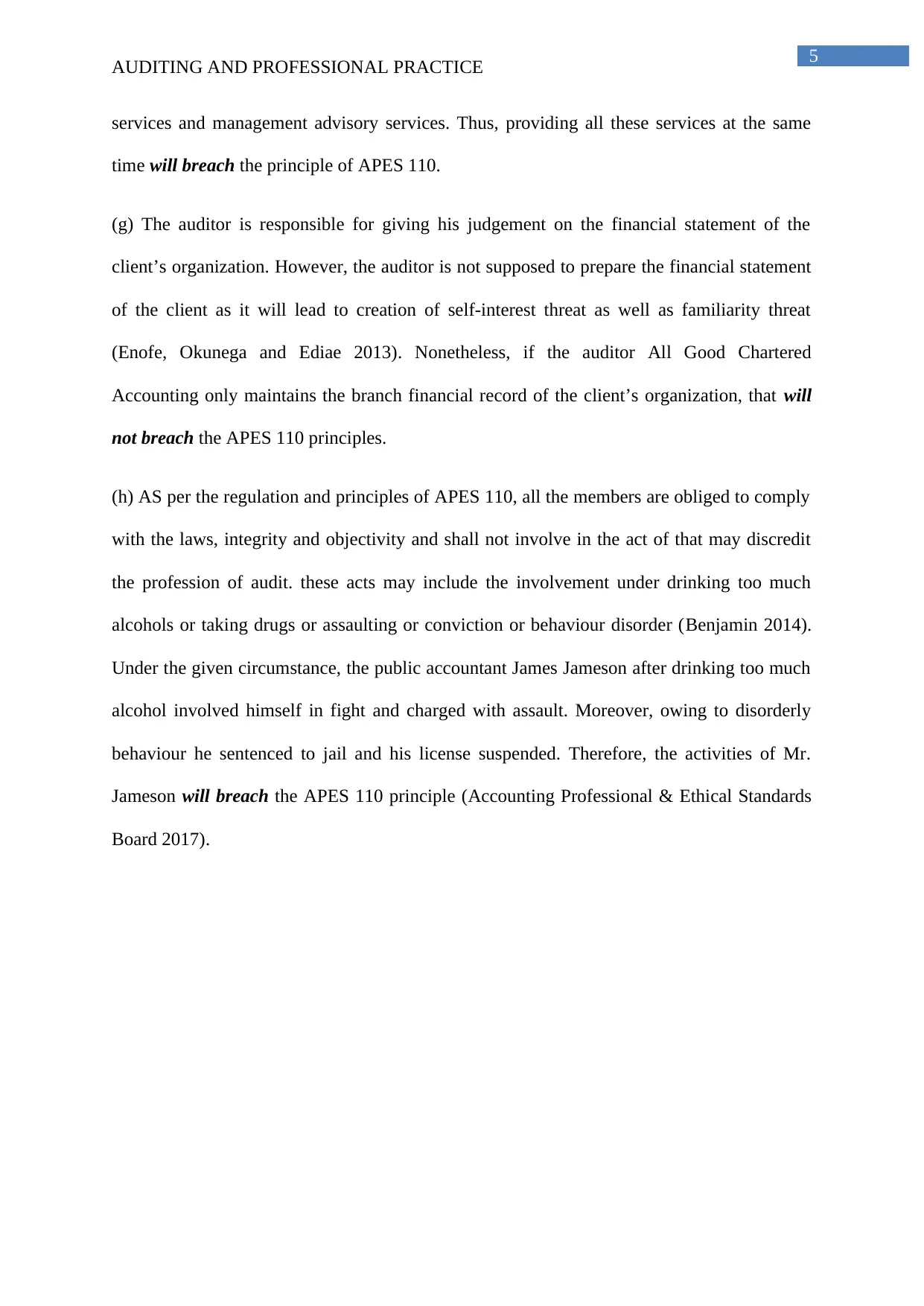
5
AUDITING AND PROFESSIONAL PRACTICE
services and management advisory services. Thus, providing all these services at the same
time will breach the principle of APES 110.
(g) The auditor is responsible for giving his judgement on the financial statement of the
client’s organization. However, the auditor is not supposed to prepare the financial statement
of the client as it will lead to creation of self-interest threat as well as familiarity threat
(Enofe, Okunega and Ediae 2013). Nonetheless, if the auditor All Good Chartered
Accounting only maintains the branch financial record of the client’s organization, that will
not breach the APES 110 principles.
(h) AS per the regulation and principles of APES 110, all the members are obliged to comply
with the laws, integrity and objectivity and shall not involve in the act of that may discredit
the profession of audit. these acts may include the involvement under drinking too much
alcohols or taking drugs or assaulting or conviction or behaviour disorder (Benjamin 2014).
Under the given circumstance, the public accountant James Jameson after drinking too much
alcohol involved himself in fight and charged with assault. Moreover, owing to disorderly
behaviour he sentenced to jail and his license suspended. Therefore, the activities of Mr.
Jameson will breach the APES 110 principle (Accounting Professional & Ethical Standards
Board 2017).
AUDITING AND PROFESSIONAL PRACTICE
services and management advisory services. Thus, providing all these services at the same
time will breach the principle of APES 110.
(g) The auditor is responsible for giving his judgement on the financial statement of the
client’s organization. However, the auditor is not supposed to prepare the financial statement
of the client as it will lead to creation of self-interest threat as well as familiarity threat
(Enofe, Okunega and Ediae 2013). Nonetheless, if the auditor All Good Chartered
Accounting only maintains the branch financial record of the client’s organization, that will
not breach the APES 110 principles.
(h) AS per the regulation and principles of APES 110, all the members are obliged to comply
with the laws, integrity and objectivity and shall not involve in the act of that may discredit
the profession of audit. these acts may include the involvement under drinking too much
alcohols or taking drugs or assaulting or conviction or behaviour disorder (Benjamin 2014).
Under the given circumstance, the public accountant James Jameson after drinking too much
alcohol involved himself in fight and charged with assault. Moreover, owing to disorderly
behaviour he sentenced to jail and his license suspended. Therefore, the activities of Mr.
Jameson will breach the APES 110 principle (Accounting Professional & Ethical Standards
Board 2017).
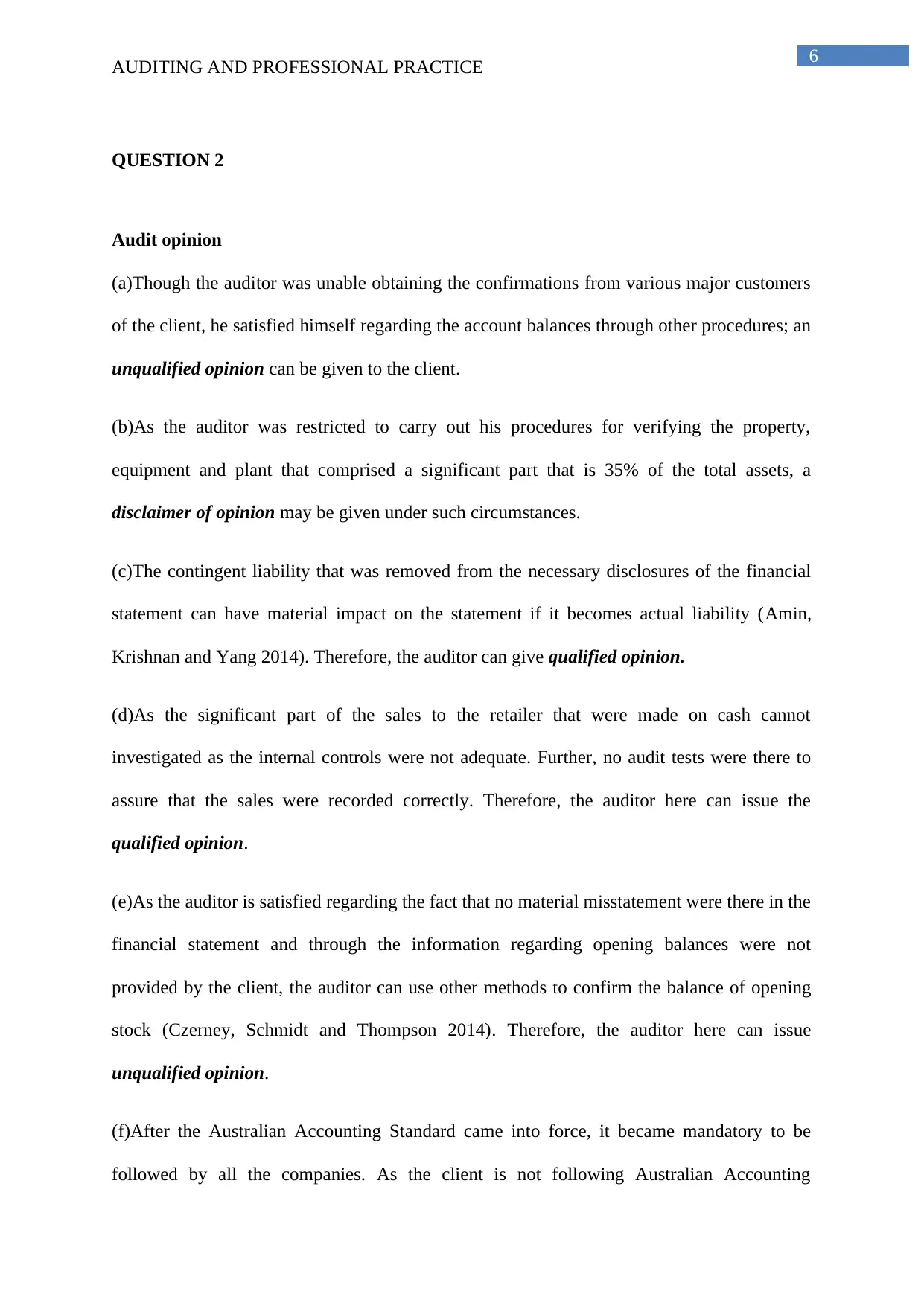
6
AUDITING AND PROFESSIONAL PRACTICE
QUESTION 2
Audit opinion
(a)Though the auditor was unable obtaining the confirmations from various major customers
of the client, he satisfied himself regarding the account balances through other procedures; an
unqualified opinion can be given to the client.
(b)As the auditor was restricted to carry out his procedures for verifying the property,
equipment and plant that comprised a significant part that is 35% of the total assets, a
disclaimer of opinion may be given under such circumstances.
(c)The contingent liability that was removed from the necessary disclosures of the financial
statement can have material impact on the statement if it becomes actual liability (Amin,
Krishnan and Yang 2014). Therefore, the auditor can give qualified opinion.
(d)As the significant part of the sales to the retailer that were made on cash cannot
investigated as the internal controls were not adequate. Further, no audit tests were there to
assure that the sales were recorded correctly. Therefore, the auditor here can issue the
qualified opinion.
(e)As the auditor is satisfied regarding the fact that no material misstatement were there in the
financial statement and through the information regarding opening balances were not
provided by the client, the auditor can use other methods to confirm the balance of opening
stock (Czerney, Schmidt and Thompson 2014). Therefore, the auditor here can issue
unqualified opinion.
(f)After the Australian Accounting Standard came into force, it became mandatory to be
followed by all the companies. As the client is not following Australian Accounting
AUDITING AND PROFESSIONAL PRACTICE
QUESTION 2
Audit opinion
(a)Though the auditor was unable obtaining the confirmations from various major customers
of the client, he satisfied himself regarding the account balances through other procedures; an
unqualified opinion can be given to the client.
(b)As the auditor was restricted to carry out his procedures for verifying the property,
equipment and plant that comprised a significant part that is 35% of the total assets, a
disclaimer of opinion may be given under such circumstances.
(c)The contingent liability that was removed from the necessary disclosures of the financial
statement can have material impact on the statement if it becomes actual liability (Amin,
Krishnan and Yang 2014). Therefore, the auditor can give qualified opinion.
(d)As the significant part of the sales to the retailer that were made on cash cannot
investigated as the internal controls were not adequate. Further, no audit tests were there to
assure that the sales were recorded correctly. Therefore, the auditor here can issue the
qualified opinion.
(e)As the auditor is satisfied regarding the fact that no material misstatement were there in the
financial statement and through the information regarding opening balances were not
provided by the client, the auditor can use other methods to confirm the balance of opening
stock (Czerney, Schmidt and Thompson 2014). Therefore, the auditor here can issue
unqualified opinion.
(f)After the Australian Accounting Standard came into force, it became mandatory to be
followed by all the companies. As the client is not following Australian Accounting
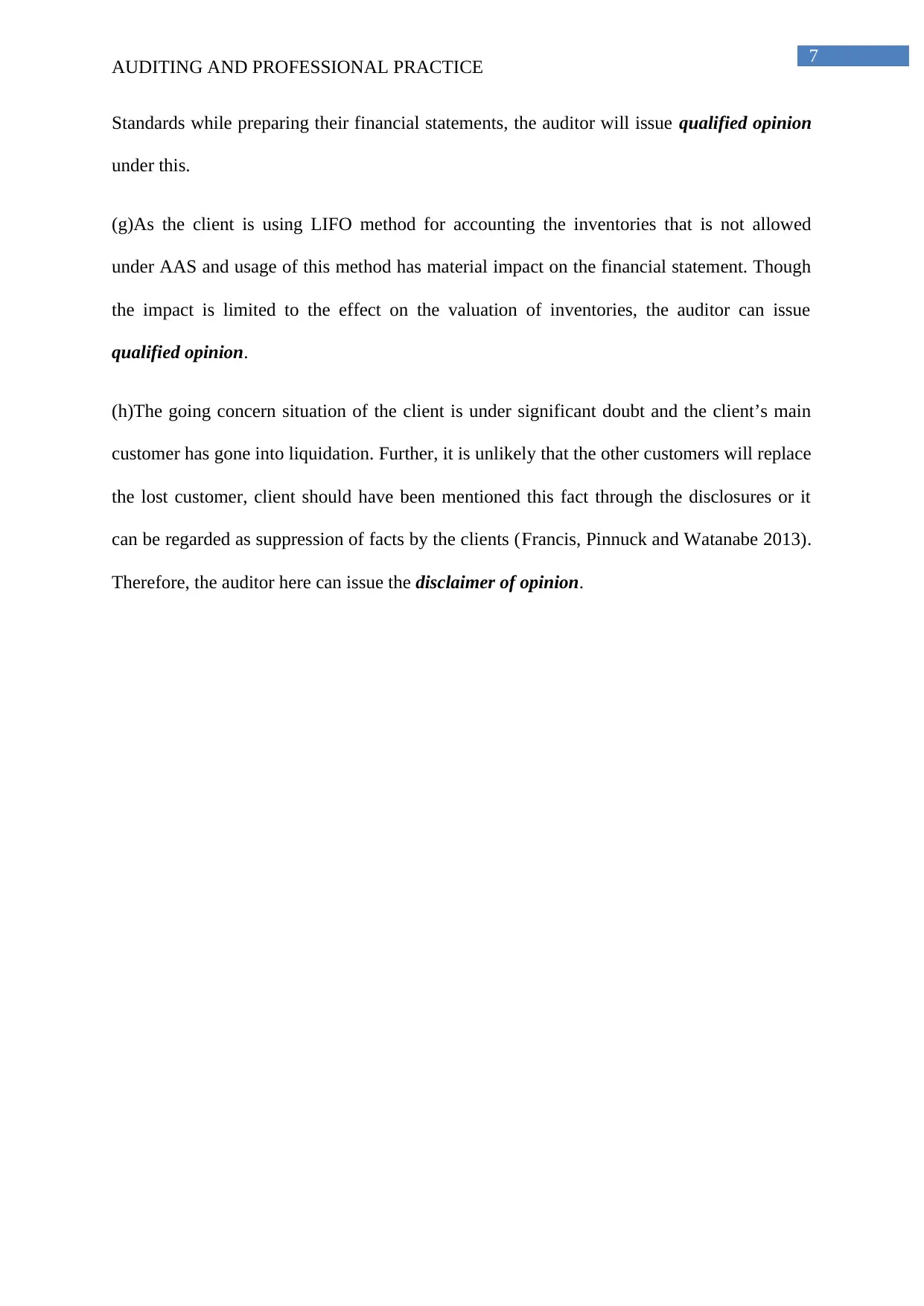
7
AUDITING AND PROFESSIONAL PRACTICE
Standards while preparing their financial statements, the auditor will issue qualified opinion
under this.
(g)As the client is using LIFO method for accounting the inventories that is not allowed
under AAS and usage of this method has material impact on the financial statement. Though
the impact is limited to the effect on the valuation of inventories, the auditor can issue
qualified opinion.
(h)The going concern situation of the client is under significant doubt and the client’s main
customer has gone into liquidation. Further, it is unlikely that the other customers will replace
the lost customer, client should have been mentioned this fact through the disclosures or it
can be regarded as suppression of facts by the clients (Francis, Pinnuck and Watanabe 2013).
Therefore, the auditor here can issue the disclaimer of opinion.
AUDITING AND PROFESSIONAL PRACTICE
Standards while preparing their financial statements, the auditor will issue qualified opinion
under this.
(g)As the client is using LIFO method for accounting the inventories that is not allowed
under AAS and usage of this method has material impact on the financial statement. Though
the impact is limited to the effect on the valuation of inventories, the auditor can issue
qualified opinion.
(h)The going concern situation of the client is under significant doubt and the client’s main
customer has gone into liquidation. Further, it is unlikely that the other customers will replace
the lost customer, client should have been mentioned this fact through the disclosures or it
can be regarded as suppression of facts by the clients (Francis, Pinnuck and Watanabe 2013).
Therefore, the auditor here can issue the disclaimer of opinion.
Paraphrase This Document
Need a fresh take? Get an instant paraphrase of this document with our AI Paraphraser
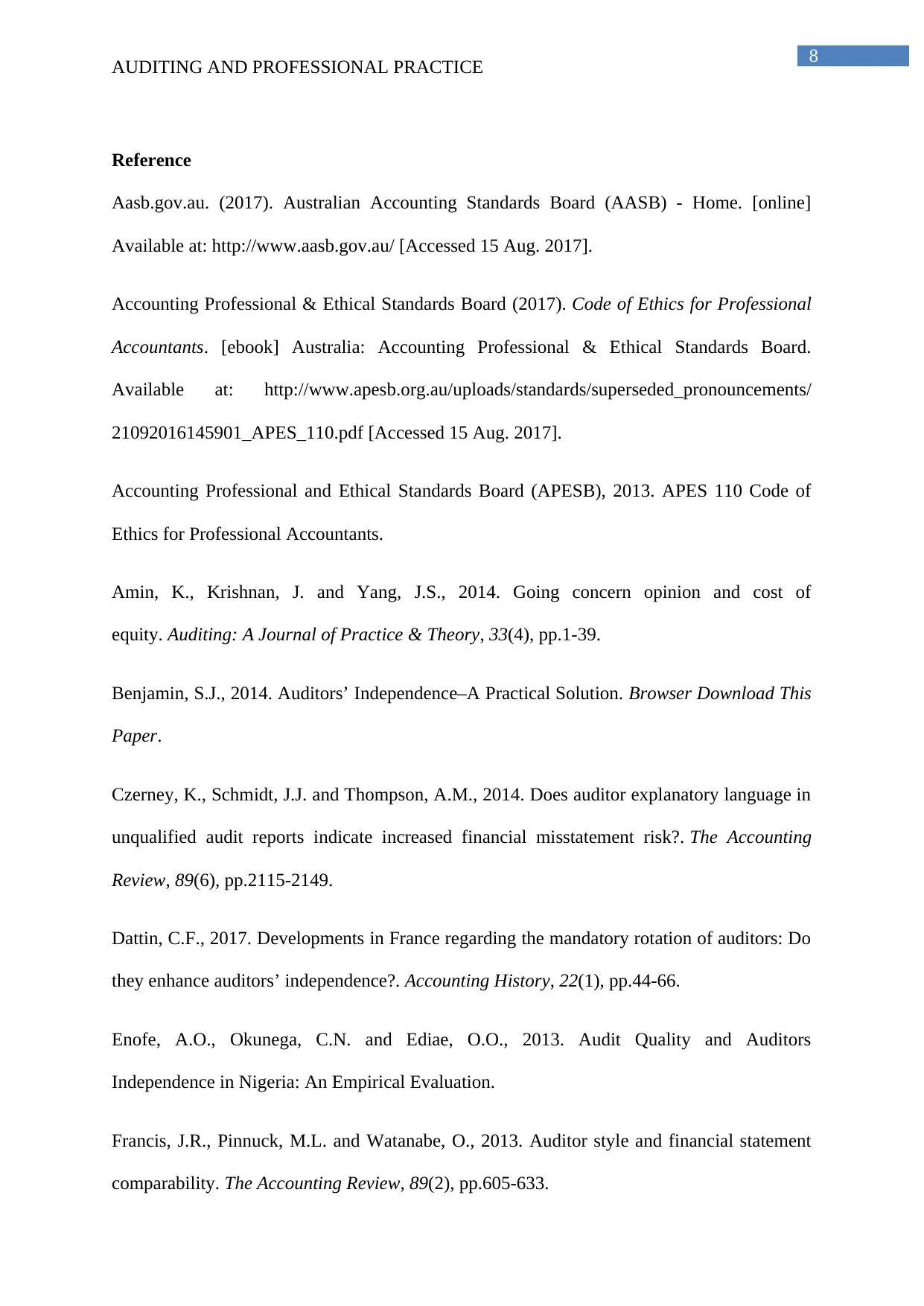
8
AUDITING AND PROFESSIONAL PRACTICE
Reference
Aasb.gov.au. (2017). Australian Accounting Standards Board (AASB) - Home. [online]
Available at: http://www.aasb.gov.au/ [Accessed 15 Aug. 2017].
Accounting Professional & Ethical Standards Board (2017). Code of Ethics for Professional
Accountants. [ebook] Australia: Accounting Professional & Ethical Standards Board.
Available at: http://www.apesb.org.au/uploads/standards/superseded_pronouncements/
21092016145901_APES_110.pdf [Accessed 15 Aug. 2017].
Accounting Professional and Ethical Standards Board (APESB), 2013. APES 110 Code of
Ethics for Professional Accountants.
Amin, K., Krishnan, J. and Yang, J.S., 2014. Going concern opinion and cost of
equity. Auditing: A Journal of Practice & Theory, 33(4), pp.1-39.
Benjamin, S.J., 2014. Auditors’ Independence–A Practical Solution. Browser Download This
Paper.
Czerney, K., Schmidt, J.J. and Thompson, A.M., 2014. Does auditor explanatory language in
unqualified audit reports indicate increased financial misstatement risk?. The Accounting
Review, 89(6), pp.2115-2149.
Dattin, C.F., 2017. Developments in France regarding the mandatory rotation of auditors: Do
they enhance auditors’ independence?. Accounting History, 22(1), pp.44-66.
Enofe, A.O., Okunega, C.N. and Ediae, O.O., 2013. Audit Quality and Auditors
Independence in Nigeria: An Empirical Evaluation.
Francis, J.R., Pinnuck, M.L. and Watanabe, O., 2013. Auditor style and financial statement
comparability. The Accounting Review, 89(2), pp.605-633.
AUDITING AND PROFESSIONAL PRACTICE
Reference
Aasb.gov.au. (2017). Australian Accounting Standards Board (AASB) - Home. [online]
Available at: http://www.aasb.gov.au/ [Accessed 15 Aug. 2017].
Accounting Professional & Ethical Standards Board (2017). Code of Ethics for Professional
Accountants. [ebook] Australia: Accounting Professional & Ethical Standards Board.
Available at: http://www.apesb.org.au/uploads/standards/superseded_pronouncements/
21092016145901_APES_110.pdf [Accessed 15 Aug. 2017].
Accounting Professional and Ethical Standards Board (APESB), 2013. APES 110 Code of
Ethics for Professional Accountants.
Amin, K., Krishnan, J. and Yang, J.S., 2014. Going concern opinion and cost of
equity. Auditing: A Journal of Practice & Theory, 33(4), pp.1-39.
Benjamin, S.J., 2014. Auditors’ Independence–A Practical Solution. Browser Download This
Paper.
Czerney, K., Schmidt, J.J. and Thompson, A.M., 2014. Does auditor explanatory language in
unqualified audit reports indicate increased financial misstatement risk?. The Accounting
Review, 89(6), pp.2115-2149.
Dattin, C.F., 2017. Developments in France regarding the mandatory rotation of auditors: Do
they enhance auditors’ independence?. Accounting History, 22(1), pp.44-66.
Enofe, A.O., Okunega, C.N. and Ediae, O.O., 2013. Audit Quality and Auditors
Independence in Nigeria: An Empirical Evaluation.
Francis, J.R., Pinnuck, M.L. and Watanabe, O., 2013. Auditor style and financial statement
comparability. The Accounting Review, 89(2), pp.605-633.
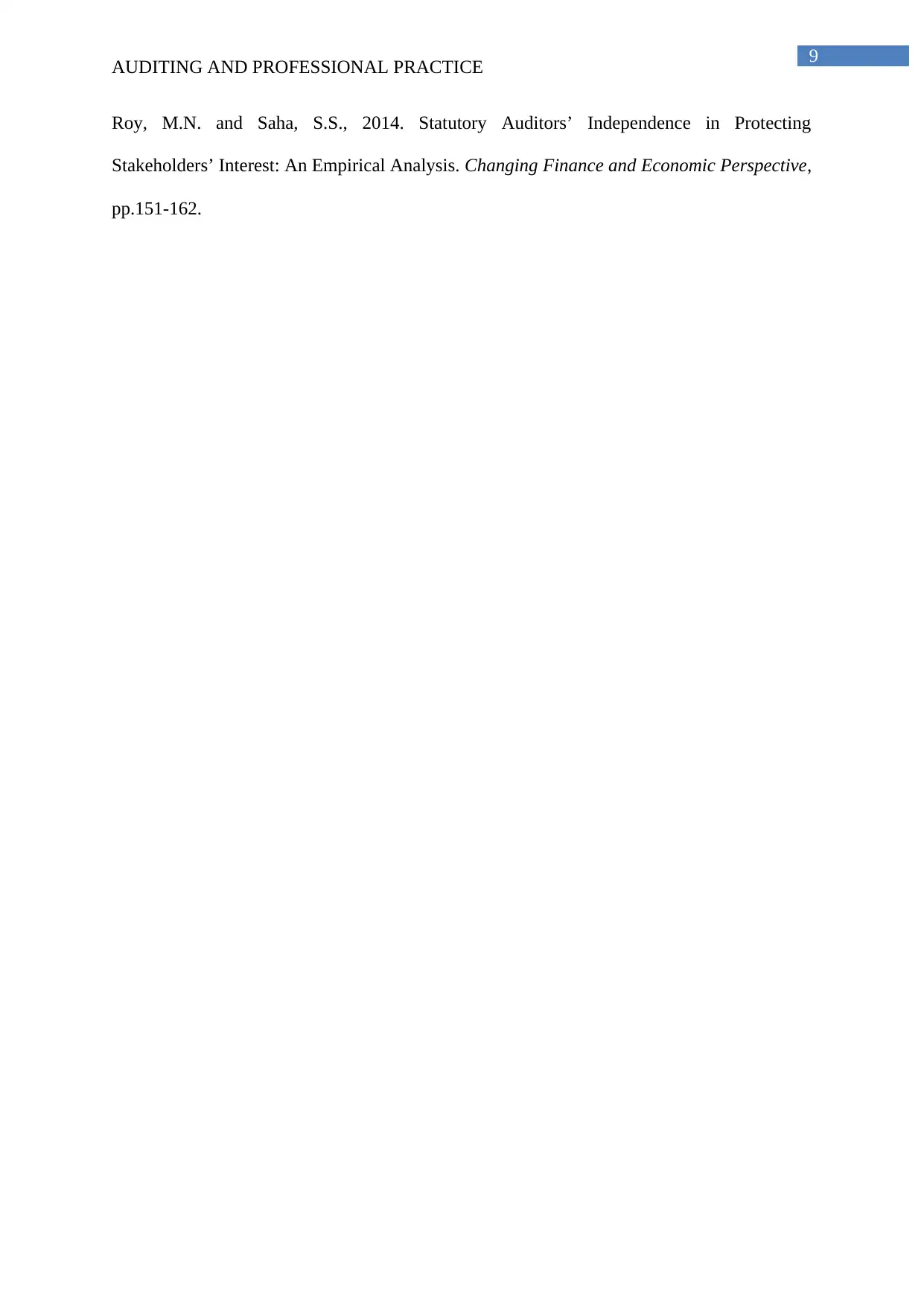
9
AUDITING AND PROFESSIONAL PRACTICE
Roy, M.N. and Saha, S.S., 2014. Statutory Auditors’ Independence in Protecting
Stakeholders’ Interest: An Empirical Analysis. Changing Finance and Economic Perspective,
pp.151-162.
AUDITING AND PROFESSIONAL PRACTICE
Roy, M.N. and Saha, S.S., 2014. Statutory Auditors’ Independence in Protecting
Stakeholders’ Interest: An Empirical Analysis. Changing Finance and Economic Perspective,
pp.151-162.
1 out of 9
Related Documents
Your All-in-One AI-Powered Toolkit for Academic Success.
+13062052269
info@desklib.com
Available 24*7 on WhatsApp / Email
![[object Object]](/_next/static/media/star-bottom.7253800d.svg)
Unlock your academic potential
© 2024 | Zucol Services PVT LTD | All rights reserved.




